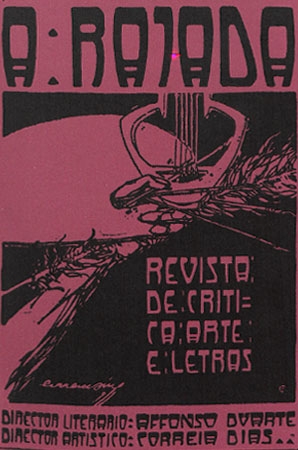
“Revista de Crítica, Arte e Letras” (Arts, Letters and Criticism review), is directed by an important poet from this period of Portuguese Modernism, linked to other magazines, Afonso Duarte - a poet well-connected with the northern universe of saudosism and bucolic nostalgia. The artistic director will be Correia Dias, who will make his career in Brazil, where he emigrates and where he marries the poet Cecília Meireles. His direction gives a great graphic consistency (starting with the vignettes), to which he also contributes with some drawings, namely "Solidão", made in Coimbra, according to the author's indication. Almada Negreiros and Christiano Cruz, two importante names in Portuguese Artistic Modernism, contribute some drawings for these issues.
Its graphic part seems to have had an enormous influence in Coimbra magazines, characterized by a lack of avant-garde flavour and old-fashioned aesthetics, as is the flagrant case of A Tradição, a magazine published in that city almost a decade later (1920), but whose covers are comparable at this level. Another case is the Porto magazine A Boémia, in its second series from 1914, or in the same year the magazine A Galera.
José Carlos Seabra Pereira describes the magazine thus: "Side by side with Dionysos, also A Rajada, amidst the ideological and aesthetic-literary indefiniteness manifested after abstaining from any programmatic proposal, was immediately witnessed in the inaugural issue by the intervention of Manuel de Sousa Pinto ‘Da arte e futuro de António Carneiro’, from Coimbra's irradiation of nostalgic Neo-Romanticism" (A Rajada, facsimile ed., Coimbra: Minerva, 2003, p.17). It is not surprising, therefore, that the ill-fated Manuel Laranjeira, who died that same year, signed a dramatic text there, a rather pessimistic 'dialogue of love' between two characters.
Four issues were published, printed in the Anuário Comercial Typography, an interesting case for a Coimbra magazine, given the distance between that city and Lisbon.
This magazine continued in a second series in Brazil, but no longer directed by Aarão de Lacerda.
Ricardo Marques
